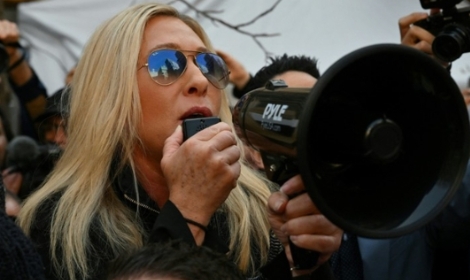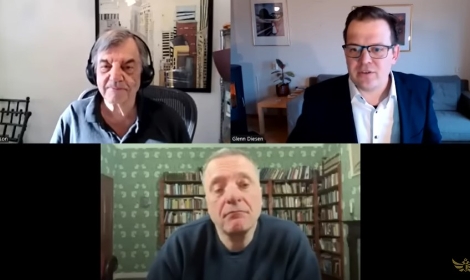是什么让美国的医疗体系如此昂贵?(三)
正文翻译
What makes the US healthcare system so expensive?
是什么让美国的医疗体系如此昂贵?
评论翻译
Laszlo B. Tamas
What makes the US health care system so expensive?
I'm not a medical economist - just a working doc - but I would submit a few factors:
1. "profit chain"
A large part of it has to do with the fact that practically every lix in the chain between a patient and a resulting diagnostic test or treatment consists of an entity that wants to maximize its profits (even the so-called "non-profit" hospitals).
Most lixs in the chain involve "fee-for-service" arrangement, so there are no brakes on the system - every entity wants through-put of higher volume or complexity (i.e. cost): insurance companies, drug companies and equipment manufacturers, hospitals, physicians, billing services etc.
The minute you insert a capitation mechanism, the incentives change, and the train runs in reverse (for better or for worse).
It's too bad that forces like "honesty" and "dedication to patients" are too weak to do much to control the more powerful force of profit. And I for one feel that our profession had not always acted as an honest broker in this system (if you can't trust your doctor - or medical professional organization - then who can you trust?).
是什么让美国的医疗保险系统如此昂贵?
我不是医学经济学家,只是一名在职医生,但我想提出一些因素:
“利润链”
这在很大程度上与这样一个事实有关,即在患者和由此产生的诊断检测或治疗之间的链条中,几乎每个环节都由一个希望实现利润最大化的实体(甚至是所谓的“非营利”医院)组成。
链条中的大多数环节都涉及“按服务收费”安排,所以这个系统没有得到抑制——每个实体都希望通过更高数量或复杂性(即成本)的投入:保险公司、制药公司和设备制造商、医院、医生、账单服务等。
一旦你引入人头机制,激励机制就会改变,事情就会反向发展(无论好坏)。
糟糕的是,像“诚实”和“对患者的奉献”这样的力量太弱了,无法控制更强大的利润力量。我个人认为,在这个体系中,我们的职业并不总是充当诚实的中间人(如果你不能信任你的医生——或医疗专业机构——那么你还能信任谁?)
2. "complexity is opportunity"
First, it should be emphasized that there are literally several thousand health insurance companies in the U.S., offering tens of thousands of plans to mostly medically (and economically) naive consumers. These plans are invariably very complex, with all kinds of qualifications, limitations, deductions and fine print, making it practically impossible for the average consumer to make an educated choice of plan.
Even I as a physician have the greatest difficulty comparing insurance plans, and I know that the insurance companies like it that way, because they are strongly resisting Obama's efforts to standardize plans to make it possible for consumers to compare them.
If I can't tell what is a good plan, what hope is there for the average non-medical person? And if they can't, then they often choose based on advertising, since they have nothing else to fall back on. In this way, the market is indeed perverted.
The same goes for the other lixs in the chain. It's really hard to know who the best doctors, hospitals, procedures, imaging technologies, drugs are (here, we doc's do have an advantage over the average consumer). The average buyer is far better able to choose a car, a house, a can opener than an insurance plan.
“复杂性就是机遇”
首先,需要强调的是,美国实际上有几千家健康保险公司,为大多数不懂医疗(和经济)的消费者提供数以万计的保险计划。这些计划总是非常复杂,有各种各样的资格、限制、扣除和细则,使普通消费者几乎不可能做出明智的计划选择。
即使是作为一名医生,我也很难比较保险计划,我知道保险公司喜欢这样,因为他们强烈反对奥巴马为使保险计划标准化而做出的努力,一旦保险计划变得标准化,消费者就有可能对保险计划进行比较。
如果我不知道什么是好的计划,那么普通的非医务人员更不可能了解了?如果他们做不到,那么他们通常会根据广告进行选择,因为他们没有其他依靠。这样一来,市场确实是扭曲的。
链条中的其他环节也是如此。很难知道谁是最好的医生、医院、手术、成像技术和药物(在这里,我们医生确实比普通消费者有优势)。与保险计划相比,普通买家在汽车、房子和开罐器方面更容易做出选择。
3. cost shifting
The cost of every lix in the "profit chain" varies, depending on the relationship between the seller and buyer. Even experienced hospital executives have great difficulty determining the "true" cost of practically anything in their hospitals, so it is impossible for the average person to know. But for every "discount," you can bet it is made up by someone else who is overcharged - and it's usually the smallest guy dealing with the chain.
The other huge cost shift is that the government gave huge break to the insurance companies by paying for the care of the highest-cost patients, such as the elderly (Medicare), the poor (Medicaid), veterans (the VA) and those with disabilities (various programs). Furthermore, hospitals who see a "disproportionate share" of the medically indigent (of any age) get help from the government. So the insurance companies are left with insuring the high-profit young and middle-aged patients who have far lower risks and costs, and the cost of those at greatest risk of being sick is shifted.
Cost shifting destroys the health of a market by making the price of items and services unknown (or so highly variable as to be meaningless in themselves), and by turning companies that used to pay your medical bills into companies that look for 15 ways to avoid paying for anything.
成本转移
“利润链”中每个环节的成本都各不相同,这取决于卖方和买方之间的关系。即使是经验丰富的医院高管也很难确定他们医院里几乎所有东西的“真实”成本,所以普通人更不可能知道。但对于每一个“折扣”,你可以打赌,它都是由被多收费的其他人编造的——而且通常是与“利润链”打交道程度最小的人。
另一个巨大的成本转移是,政府通过支付费用最高的病人的护理费用,如老年人(医疗保险)、穷人(医疗补助)、退伍军人(退伍军人事务部)和残疾人(各种项目),给了保险公司很大的优惠。此外,存在医疗贫困患者(任何年龄)“不成比例”的医院会得到政府的帮助。因此,保险公司只能为那些风险和成本都低得多的高利润中青年患者提供保险,而那些患病风险最高的患者的成本被转移了。
成本转移破坏了市场的健康,因为它使商品和服务的价格变得未知(或者变化很大,以至于本身变得毫无意义),并通过将过去为你支付医疗费用的公司变成寻找15种方法来避免支付任何费用的公司。
4. turning needs into diseases
In the U.S. - and only in the U.S. - we have the emergence of massive costs for new "diseases" that in other parts of the world would not be considered common diseases. A few examples:
- "erectile dysfunction"
- "restless leg syndrome"
- "panic and anxiety disorders"
Each one of these "diseases" is reaching epidemic proportions here, and have created billion dollar markets for their treatments.
I'm not saying that there is no real medical need in these entities, and certainly all of us have seen patients disabled by them, but since the U.S. allows TV and other advertising for drugs, the pharmaceutical industry has popularized "diseases" people didn't even know they had, and used them to lead people to visit their doctors (who are allowed 10 minutes with the patient by their plan) and ask for prescxtions for the drugs they see on TV. If you talk to colleagues in Europe, they laugh at us "hypochondriac Americans."
将需求转化为疾病
在美国,也只有在美国,我们为新“疾病”付出了巨大的代价,而在世界其他地方,这些疾病并不被视为常见疾病。举几个例子:
“勃起功能障碍”
“不宁腿综合征”
“恐慌和焦虑症”
这些“疾病”中的每一种都达到了流行病的程度,并为它们的治疗创造了数十亿美元的市场。
我并不是说在这些疾病没有真正的医疗需求,当然我们所有人都见过被它们致残的患者,但自从美国允许电视和其他药物广告以来,制药业普及了人们甚至不知道自己患有的“疾病”,并利用这些疾病引导人们去看医生(根据他们的计划,医生只允许与病人见面10分钟),并要求医生开出他们在电视上看到的药物的处方。如果你和欧洲的同事交谈,他们会嘲笑我们是“患有忧郁症的美国人”。
ADDENDUM:
Leading psychiatrist Dr. Allen Frances has written an interesting editorial in the Annals of Internal Medicine (May 17, 2013) about "The New Crisis in Confidence in Psychiatric Diagnosis" represented by the new DSM-5, which helps clinicians diagnose mental illness: "New psychiatric diagnoses are now potentially more dangerous than new psychiatric drugs. Diagnostic expansions lead to drug company promotions that dramatically increase the use of unnecessary medications, with high cost and potentially harmful side effect."
附加项:
著名精神病学家Allen Frances博士在《内科学年鉴》(2013年5月17日)上写了一篇有趣的社论,内容是以新的DSM-5为代表的“精神病诊断信心的新危机”,这有助于临床医生诊断精神疾病:“新的精神病诊断现在可能比新的精神病药物更危险。诊断范围的扩大导致制药公司的促销活动,大大增加了不必要药物的使用,这些药物成本高,而且有潜在的有害副作用。”
5. "newer is better"
No other people have a love of the new as much as Americans, and any time a patient is told that they will be offered the latest and greatest therapy for something, they can't wait to try it. This makes it all too easy for every lix in the "profit chain" to sell more expensive products, many of which have little evidence of being any better than what came before.
In surgery, the best example is probably that there is no approval mechanism necessary for new surgeries, unlike the way the FDA has to approve a new drug based on scientific proof that it is effective and safe. For example, we are seeing increases of 100 - 200% over the last 5 - 10 years in some more complex surgeries for pain whose effectiveness many question.
“更新越好”
没有其他人像美国人一样喜欢新产品,每当患者被告知他们将获得最新、最棒的治疗方法时,他们都迫不及待地想尝试。这使得“利润链”中的每个环节都很容易销售更昂贵的产品,不过其中许多产品几乎没有证据表明比以前更好。
在外科手术中,最好的例子可能是,新手术没有必要的审批机制,不像FDA必须根据科学证据批准新药,证明它是有效和安全的。例如,在过去的5 - 10年里,我们看到一些更复杂的疼痛手术增加了100 - 200%,这些手术的有效性受到许多质疑。
6. little emphasis - or reimbursement - for preventative care
The only profit for things like lowering the number of smokers in the country is in the lives of the patients themselves. No lix in the "profit chain" has any financial interest in this.
For improving this alone, I thank Obama.
对预防性护理的重视或报销不足
像降低该国吸烟者数量这样的事情唯一的好处是有利于患者自己的生活。“利润链”中的任何环节都与此无关。
仅凭这一点,我就感谢奥巴马。
7. the degradation of insurance companies
These are the one class of entities that have no particular ethical code, no tradition of healing to uphold, have (until recently) not been under much scrutiny, and are up-front for-profit organizations through which most health care dollars flow.
Over the years, these companies have become increasingly outlandish in squeezing ever more profits through nauseating practices such as dropping coverage when people actually dare to get ill, ever-increasing deductibles, ceilings to coverage, extortionate rates, red-lining ... on and on.
I suppose you could say that they are, after all, in it to make a profit, but then so is the Mafia.
Anyway ... there are probably dozens more reasons, and a medical economist could write far more coherently on this than I can.
保险公司的降级
这些实体没有特定的道德规范,没有需要维护的治疗传统,(直到最近)也没有受到太多的审查,而且是大部分医疗资金都流向的预先营利组织。
多年来,这些公司已经变得越来越古怪,通过令人作呕的做法来榨取越来越多的利润,比如在人们真的敢生病的时候减少保险范围,不断增加免赔额和保险范围的上限,勒索率,红线等等。
我想你可能会说,他们毕竟是为了赚钱,但黑手党也是如此。
无论如何可能还有几十个原因,医学经济学家可以比我写得更有条理。
I can recommend this really nice book that puts things into global perspective:
"The Healing of America: A Global Quest for Better, Cheaper and Fairer Health Care" by T.R. Reid
And another that will open many eyes:
"Hope or Hype: The Obsession with Medical Advances and the High Cost of False Promises" by Rick Deyo (who has been a Professor of Medicine at the University of Washington)
我可以推荐这本很棒的书,它从全球的角度看待问题
T.R.Reid的《美国的治愈:全球寻求更好、更便宜、更公平的医疗保险》
另一本书会让很多人大开眼界:
Rick Deyo(华盛顿大学医学教授)的《希望还是炒作:对医学进步的痴迷和虚假承诺的高昂代价》
Linda Barnard Waldroup
A small example here. I call it the “1 Tylenol costs $37 dollars in the hospital” syndrome. I have sleep apnea. I am due a new machine every 5 years, a new mask and headgear every 6 months, a new plastic seal for the mask every month and so forth. Mind you nothing is wrong with all of these. My mask looks just as good now as it did over 6 months ago and my machine is about 7 years old.
So every 6 weeks or so, somebody calls and asks me if I need anything and I say no, everything works. They say I am due a new mask, which I should have (My mask is over $200, then there’s the head-gear which is another $40 or so). They insist I get the plastic seal, new hose and a filter. I say what I have is just fine. Then they argue with me. I hang up after telling them I don’t need anything.
The point? A new mask and head gear is over $250, out of which I pay $28. The insurance and the ones pushing the c-pap equipment divide the rest. The one making the $ is the c-pap place but all this is lost in the paperwork.
In addition, should I need the new machine, they will send me for a sleep study which costs a couple thousand. That, in a nutshell, is what happens to the healthcare system. Lots of paper-shuffling (well it’s computer shuffling now), no accountability and even the doctors do not know what the Rx costs when you ask them. I should not complain because I have good coverage if I stay within the network and my doctors are very kind to me.
But I understand the system isn’t sustainable as it is. That’s all I know
这里有一个小例子。我称之为“泰诺在医院的价格是37美元”综合征。我有睡眠呼吸暂停症。我每5年换一台新机器,每6个月换一个新呼吸面罩和头套,每个月换一个新的呼吸面罩塑料封条,等等。请注意,所有这些都没有问题。我的呼吸面罩现在看起来和6个月前一样好,我的机器已经用了7年了。
所以每隔6周左右,就会有人打电话问我是否需要什么,我说不要,一切都好。他们说我应该买一个新呼吸面罩(我的呼吸面罩超过200美元,还有头部装备,大约40美元)。他们坚持要我去拿塑料密封、新软管和过滤器。我说我所拥有的一切都很好。然后他们和我争论。我告诉他们我什么都不需要后挂断了电话。
重点是什么?一个新的呼吸面罩和头部装备售价超过250美元,其中我支付了28美元。保险和推动c-pap设备的人瓜分了剩下的部分。赚钱是推行c-pap的人,但所有这些都没有被记录在文书工作中。
此外,如果我需要这台新机器,他们会派我去做睡眠研究,费用为几千美元。简而言之,这就是医疗体系的现状。大量的文书工作(好吧,现在是电脑工作),没有问责制,甚至当你问医生时,他们也不知道处方药的价格。我不应该抱怨,因为如果我留在体系中,我的保险范围是很不错的,而且我的医生对我很好。
但我知道这个系统是不可持续的。我就知道这么多。
Christian Winter
As a European, would you prefer the US healthcare system?
No. As a German I pay a fixed percentage of my income and have almost all expenses paid. I pay a little more than 300 Euros a month although I have an above average income. I have to pay extra for glasses, dental prostheses or when I have to go to hospital. I would have to pay a little extra for prescxtion drugs or orthotics. But that’s about it. All in all really affordable.
The US health care system actually is not a health care system, it’s a scam to squeeze as much money out of the patients as possible and if it cannot be avoided at all treat a few of them. That’s what you get if you turn everything into a business scheme.
作为欧洲人,你更喜欢美国的医疗体系吗?
不,作为一名德国人,我根据收入支付固定比例的医疗保险,几乎所有的开支都是自己支付的。虽然我的收入高于平均水平,但我每月支付300多欧元。我必须支付额外的眼镜、假牙或去医院的费用。我得为处方药或矫形器多付一点钱。但仅此而已。总之,真的很实惠。
美国的医疗保险系统实际上不是一个医疗保险系统,这是一个骗局,目的是从患者身上榨取尽可能多的钱,如果无法避免的话,可以治疗其中的一些人。如果你把一切都变成一个商业计划,你就会得到这样的结果。
Karl Baker
Why is healthcare in America so expensive? How do other countries pay less and get more out of their healthcare system?
American healthcare favors inefficiency. Hospitals and insurance companies are in a constant battle. Hospitals try and think up ways to charge you and insurance companies try and think up ways not to pay you. And the really really crazy thing is that you pay money month after month for insurance and then when you get sick you still have to pay out. And that pay out is probably what you would pay anyway for private treatment anywhere in the world. So you are literally paying money for nothing
为什么美国的医疗保险如此昂贵?其他国家如何减少支付,而且从医疗系统中获得更多的?
美国的医疗保险倾向于低效率。医院和保险公司之间的斗争持续不断。医院想办法向你收费,保险公司想办法不向你付款。真正非常疯狂的事情是,你一个月又一个月地支付保险费,然后当你生病时,你仍然需要支付医疗费用。这笔钱可能就是你在世界任何地方找私人治疗时支付的费用。所以你实际上是白花了钱。
Michelle - MAD PIRATE QUEEN
Why are some Americans so opposed to universal healthcare?
I’ve had exchanges with a few and the biggest complaint seems to be:
Some people are under the impression that universal healthcare will cost them lots more when it will in fact save them a whopping great chunk of change (as has been proved in all advanced countries with a universal healthcare).[1]
Some people are selfish f#cks who don’t want others to benefit directly from anything that they haven’t contributed to at the same level (or to whatever subjective standard the person has). They would rather pay more (just to ensure that the person down stream goes without) because they’re individualistic to the point of insanity and either don’t care that something is good for everyone if it gives them the chance to punish people or feel superior.
If someone is saying “I would rather pay more in medical expenses because f#ck THAT guy over there…”, there’s not a lot you can do with that. → You can’t teach people how to feel empathy or be the kinds of people that seek to make the world a better place for others.
为什么一些美国人如此反对全民医疗?
我与一些人进行了交流,最大的抱怨似乎是:
有些人认为,全民医保会让他们付出更多的代价,而事实上,它会为他们节省一大笔开支(所有实行全民医保的发达国家都证明了这一点)。
有些人是自私的混蛋,他们不希望别人从他们没有在同一水平上做出贡献的任何事情中直接受益(或者根据个人的主观标准)。他们宁愿付出更多(只是为了确保不如他的人无法收益)因为他们的个人主义达到了疯狂的程度,他们要么不在乎某件事是否对每个人都有好处,只要它给了他们惩罚别人的机会,要么让他们觉得自己高人一等。
如果有人说“我宁愿支付更多的医疗费用,因为那个该死的家伙…”,你能做的不多的。因为你无法教会人们如何去感受同理心,或者成为那种为他人创造更美好世界的人。






